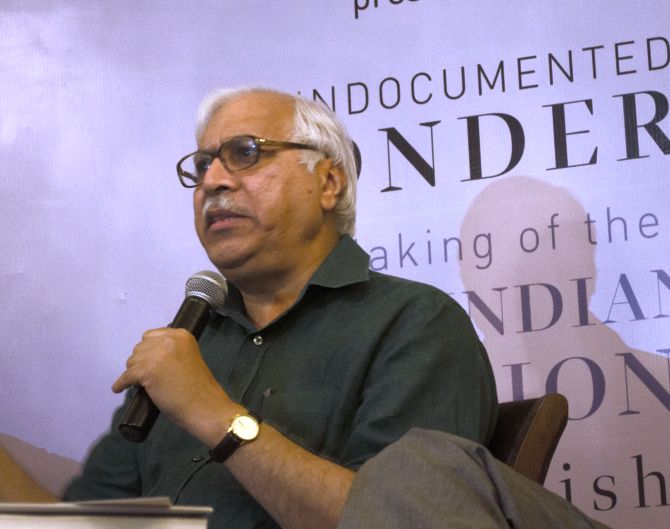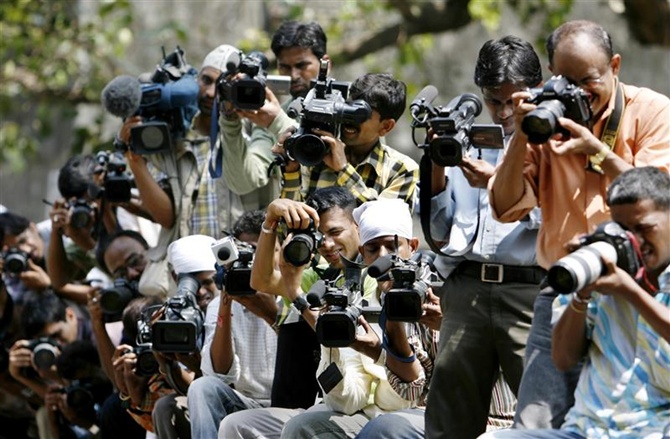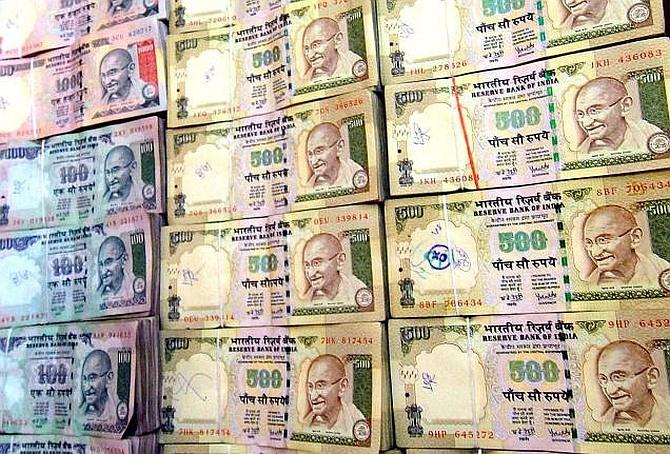Photographs: Aniruddh Sheth Upasna Pandey
‘Electoral reforms are a must and many key proposals have been pending for as long as 20 years. The ban on candidates with criminal background is important so that law breakers do not become law makers.’
‘The more prominent the leader violating the code of conduct, the higher the impact it is expected to have.’
There is no exception for any candidate or political party when it comes to the law, be it the Representation of the People Act, the Indian Penal Code or the model code of conduct, SY Quraishi, former Chief Election Commissioner tells Rediff.com contributor Upasna Pandey.
SY Quraishi, the man who has been in the hot seat as the Chief Election Commissioner from 2006-2012, recently released a book 'An Undocumented Wonder: The Making of The Great Indian Elections’. He spoke with Upasna Pandey about the ongoing election process.
Quraishi said is happy with the overall high voter turnout, which he believes is a result of consistent and planned efforts of the Election Commission. He, however, expressed concern over the rampant violations of the model code of conduct, use of money power, and the distorted coverage by the media. He spoke about the need for much-delayed electoral reforms and the role of political parties like the Aam Aadmi Party in changing the overall election landscape in the country.
What is your view on the recent incident of violation of the model code of conduct by BJP’s prime minister candidate Narendra Modi?
There are laws, including the Representation of the People Act, the Indian Penal Code and the model code of conduct. Everyone is expected to follow it. There is no exception for any candidate or party.
How do you view violations of model code of conduct by candidates and how does it impact the election? How do you see recent violations in the form of provocative speeches by candidates?
Definitely the violations of in the model code of conduct have been more rampant in this election. There is more loose talk by candidates this time. The more prominent the leader violating the code of conduct, the higher the impact it is expected to have. However, this is a double edged sword. There would be voters who may be offended or repulsed by provocative statements by candidates while some others would be pleased.
...
'Media is the eyes and ears of the Election Commission'
Photographs: Reuters Upasna Pandey
What is your take on the use of money power in the current elections and monitoring by EC?
Use of money power is an ongoing problem for the Election Commission and this election has definitely seen high use of money power by candidates and political parties. The EC has been vigilant and there are reports of crores being seized. Though there is a limit on the expenditure made by candidates, there is no limit of money that can be spent by political parties. This needs to be changed, as it disturbs the level playing field for candidates.
What is your view on the delay in electoral reforms?
Electoral reforms are a must and many key proposals have been pending for as long as 20 years. They are critical to improve the election process in India. The ban on candidates with criminal background is important so that that law breakers do not become law makers. There are proposals to usher transparency in political party funding, audit of political party funds by an independent panel suggested by the EC and a report to be made available to the public on websites.
These are some of the reforms which have been pending. Also, limiting a candidate from contesting from one seat instead of two is another long pending reform for the EC. The candidate who wins from two seats should be made to bear the expense of holding the bye election in the seat that is vacated by him/her.
What is your view on the role of the media in the ongoing election?
Media is the eyes and ears of the Election Commission. They are seen as the watchdog of democracy. The media has been assisting the EC by urging voters to cast their ballot, creating enthusiasm and raising voter education level. It shows in the high turnout of voters across the country.
However, there is the issue of distorted coverage, which may be a result of the culture of paid news. Prejudice in coverage, which is the negative side of the media, was seen in this election too.
...
'Role of money power in the election is worrying'
Upasna Pandey
What is your view on the way elections have been conducted, covered by the media and participation of public and politicians?
I am extremely happy with the high turnout of voters across the country which has been a result of planned and organised efforts by the Election Commission over the years. We set up the voter education programme 4 years ago and we undertook extensive research into knowledge, behaviour and attitude of voters across the country. So the efforts are paying off in the form of high turnout and it does not come as a surprise to me.
The high number of violations of model code of conduct is an unhappy sign and the active role of money power in the election is also worrying. The Election Commission has played its limited role, it has been quite vigilant but black money cannot be wished away entirely. There are also reports of missing voters which, I am sure, is being looked into by the EC.
How do you view the role of political parties such as the AAP in the election process?
I think AAP has been able to make a difference for sure. The party has ensured that corruption becomes a core issue in elections and has demonstrated that candidates can contest with limited funds. The funding of AAP has been made transparent which is commendable. Candidates who have a clean background have been given tickets and AAP has shunned candidates with criminal background, which is a welcome development. We can hope that public education and pressure can help further spread this to other political parties as well.
When I was the CEC, we coined the slogan ‘Vote ethically without any enticement’ and that is what we hope happens in the long run.
What is your message in your recently released book 'An Undocumented Wonder: The Making of The Great Indian Elections’?
The elections in India are mind-boggling in every sense and perhaps the world’s biggest management event. But people know very little about what goes behind the scenes. I wanted to demystify the election process for people to understand this better.
This book was meant to be released at the time of my retirement but due to some issues with publishing houses, it got postponed and now it has been released. I think it would have been more effective if this was released two months back.




article